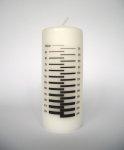In many fantasy games, such as Pathfinder or any of the D&D editions, there are items that work "Once per day", or people who get spells or abilities renewed once per day.
In common parlance this usually means that it happens at a particular time, like sunrise or midnight or some such.
I'm in a game where the characters ate at or near the North Pole. (Something about helping a right jolly old elf or something like that). It being at or near the midwinter (i.e. it's December), the sun hasn't risen here for several months, and it won't rise for several more.
So when do Clerics get their spells? When do "once per day" powers and items recharge?
That is, in a fantasy world where portable timepieces pretty much don't exist, and the Sundial is considered sound technology, how does anyone (including the DM) determine when events like that have to happen?
This is actually a really interesting question. Never having ran an artic campaign, it never came up before for me.
The very simple answer is that it happens every 24 hours whether the players can keep track of time or not. Certainly in the case of something like a wizard's spells, the idea seems to be that the wizard needs a certain amount of mental rest. 1e AD&D even experimented with little used rules that allowed different level spells to be refreshed with different degrees of rest. How much rest you get doesn't depend entirely on time per se, so presumably as long as the sun doesn't keep the wizard from resting, the passage of time is the same refreshing property whether the sun goes up or not.
But in my game clerics recover spells at propitious moments when the power of their deity is waxing. So for example, the cleric of the sun deity regains spells at sunrise and needs to be praying as sunrise happens to recover spells. And the cleric of the deity the pyschopomp deity that protects souls on their journey in the afterlife regains spells in the twilight following sunset, since this is the time of day the signifies the transition to a time of rest and death.
But what do you do in the event this natural calendar is disrupted?
One possible answer is that the natural calendar isn't disrupted. There is no particular reason why the game world is a round ball orbiting a giant nuclear explosion and tilted on its axis to create seasons. It's quite possible that at the north or south pole the day is pretty much the same as it is elsewhere on the world. It's even possible the world is flat and the south pole per se doesn't exist. So depending on what your fantasy world is like, you might evade the question entirely.
But, presuming you don't want to engage in that sort of high fantasy imaginings necessary to maintain coherence in a world that little resembles our own, and you just want to use the familiar knowledge of the real world, it's not at all obvious what happens in these cases.
Because while it may be true that normally a cleric of the sun can only recover spells at day break, it may equally be true that nothing could be more propitious and exemplify the power of the unconquered sun more than never setting. It could be that far from only recovering spells at sunrise, a sun cleric in a land of eternal sun doesn't have to worry about recovering spells at all or recovers them at an increased rate. Conversely, a sun cleric in a land where the sun never rises might be cut off from deific power in part or completely.
It's totally therefore up to the DM and the particulars of the cult in question.




